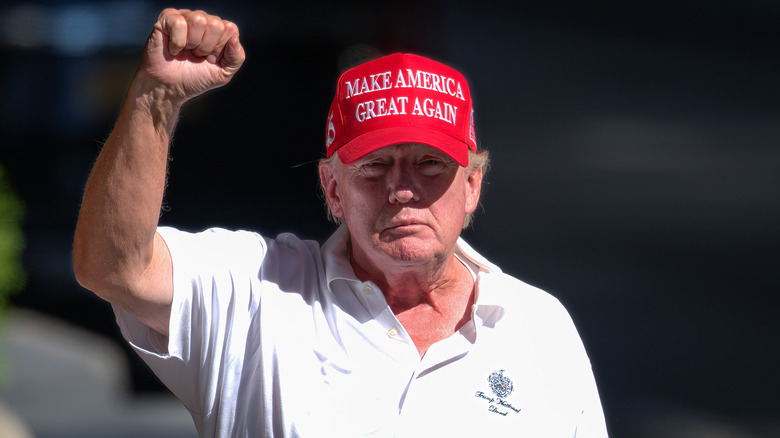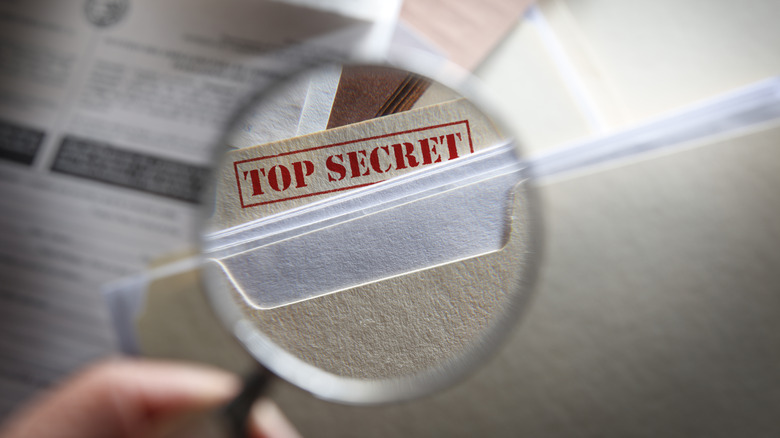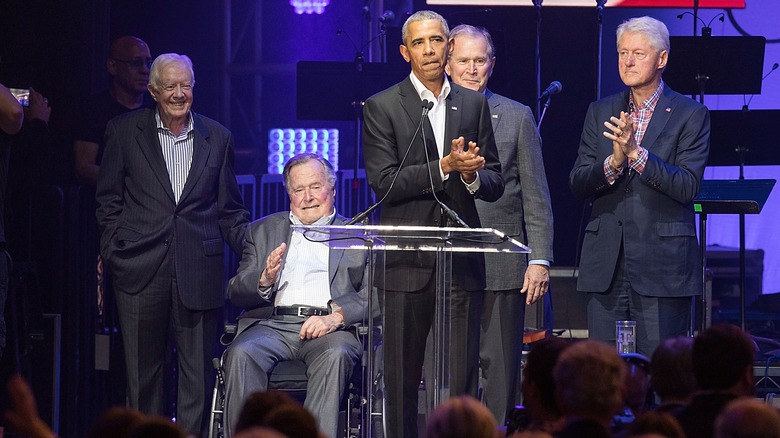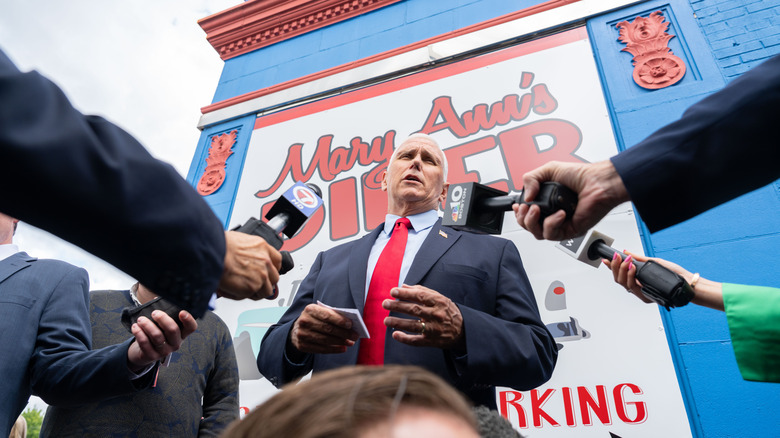How Many Presidents And Vice Presidents Have Taken Classified Documents (That We Know Of)?
In 2023, Donald Trump was indicted amid his 2024 presidential campaign — with allegations of paying hush money to adult film star Stormy Daniels still brewing. As the BBC overviews, the indictment stemmed from last year's FBI raid on Trump's Mar-a-Lago residence, where agents seized over 11,000 documents, including 100 classified documents and a few "top secret" ones. In response to being indicted, Trump said on his social media platform Truth Social, "This is indeed a dark day for the United States of America. We are a country in serious and rapid decline, but together we will Make America Great Again!"
Many wondered how illegal it is for presidents to hold government documents in private residences. After all, plenty of folks take their work home with them. Is it any kind of full-fledged crime, or is it just a bad idea? As The Washington Post says, it's "illegal to mishandle classified information" per the Presidential Records Act of 1978 put into action by Jimmy Carter. "Classified" seems to be the key distinction, as the National Archives and Records Administration (NARA) — the body responsible for document maintenance — states that's perfectly fine to take documents home so long as they're returned when a president leaves office. In the end, USA Today explains that we know for certain of three individuals who've broken the rules: Trump, his vice president Mike Pence, and President Joe Biden.
Classified and secure
Because it was only officially illegal for a president or vice president to keep classified government documents at home as of 1978, it stands to reason that other government officials might have done so before then. If so, we'd have no way of knowing. USA Today says that even Jimmy Carter kept some documents at home, and he's the one who signed the Presidential Records Act of 1978 into law. Carter, however, committed no crime because his Presidential Records Act didn't go into effect until the next president — Ronald Reagan — came to office in 1981.
In general, NPR states that government documents used to be handled much more casually than now. Timothy Naftali, former director of the Richard Nixon Presidential Library and Museum, says that presidents and former presidents used to be able to waltz into the National Archives and pluck out files willy-nilly to take home with them to "write their memoirs." Now, presidents and vice presidents can go to the National Archives and access what classified materials they want, but they can't take anything with them — documents must stay in secure locations. Naftali does not, however, comment on declassified documents, because those seem to be fair game to bring and keep in personal residences. And for the record, the National Archives and Records Administration states that presidents and vice presidents are on equal terms when it comes to accessing and holding onto government documents. Whatever applies to one applies to both.
Identifying the innocent
USA Today discusses which presidents and vice presidents have complied with document regulations since the Presidential Records Act was put into law. As it stands, Presidents Barack Obama, George H.W. Bush, George W. Bush, Bill Clinton, and vice presidents Al Gore and Dan Quayle willingly handed over to the National Archives whatever documents were in their possession when they left office. No wrongfully held materials were found in any of those individuals' private residences, and no materials have been found since. Dick Cheney, for the record, refused to comply with requests that he relinquish documents. He even fought to remove such rules entirely. USA Today says that it still remains unknown whether or not he held on to any documents upon leaving office, or kept any classified documents to begin with.
To complicate matters further, former president Donald Trump falsely claimed on Truth Social that Obama took 33 million classified nuclear documents home to Chicago, per USA Today. He also falsely claimed that the elder Bush "took millions and millions of documents to a former bowling alley pieced together with what was then an old and broken Chinese restaurant," per Insider. On the contrary, the BBC reports that it's Trump who stored allegedly documents related to "nuclear secrets" in his shower and ballroom. And yet, despite such false claims, NBC News reports that the National Archives held a recent closed-door meeting where they stated that "every administration since President Ronald Reagan's has mismanaged classified documents."
Revealing the guilty
That brings us to the two known, guilty, document-holding parties: President Joe Biden and former vice president Mike Pence. As CNBC said in January this year, authorities found multiple batches of documents unlawfully held in Biden's possession. The first batch of less than a dozen documents dates back to Biden's pre-governmental days. The second batch was found in the garage of Biden's Delaware home. Regarding the second batch Biden said, "As I said earlier this week, and by the way, my Corvette is in a locked garage, so it's not like they're sitting out on the street." He also said that he "take[s] classified documents and classified materials seriously" and was fully cooperating with the U.S. Department of Justice. NBC News stated in August 2023 that there's been no progress on the case.
Former vice president Pence, on the contrary, has seen his document kerfuffle come to a close. As Politico says, it was Pence himself who reached out to authorities after Biden's documents were discovered back in January — he wanted his house to be searched to make sure he didn't have any classified or declassified documents in his possession. He did, but will not be facing charges, presumably because he took the initiative to check.
The National Archives, meanwhile, is considering asking — via letters, per CNN — every single former president and vice president to see if they wouldn't mind checking whether or not they're still keeping government documents. All things considered, this is probably a good idea.



